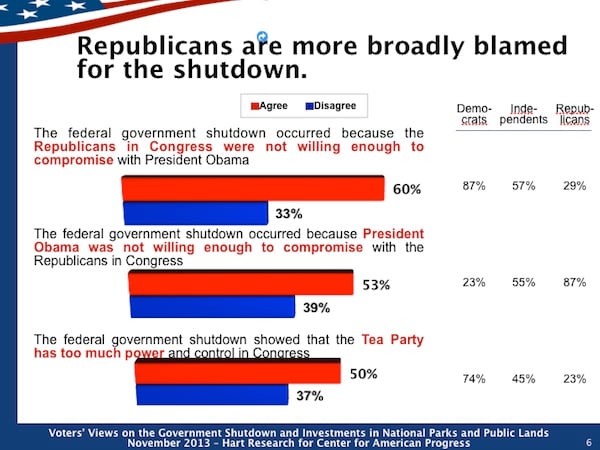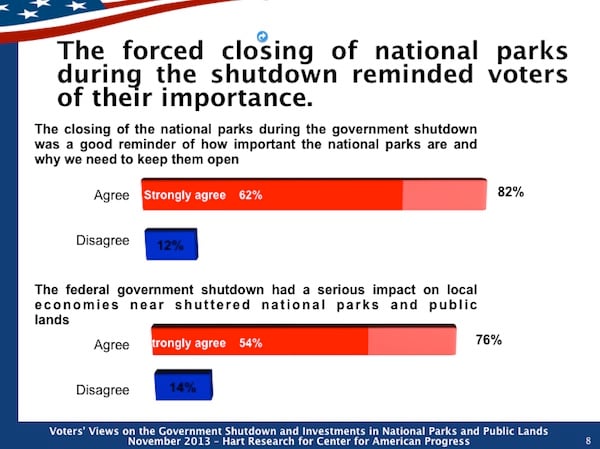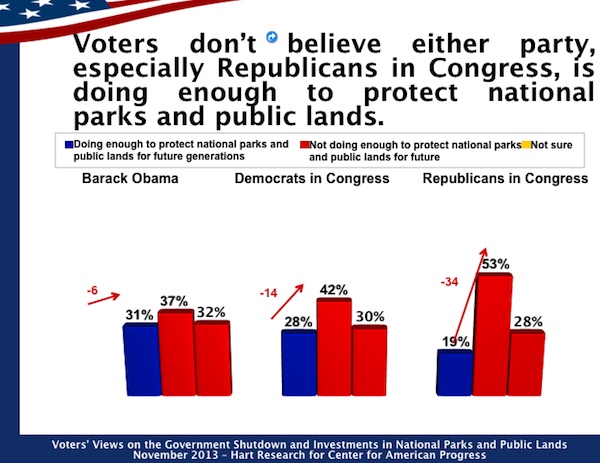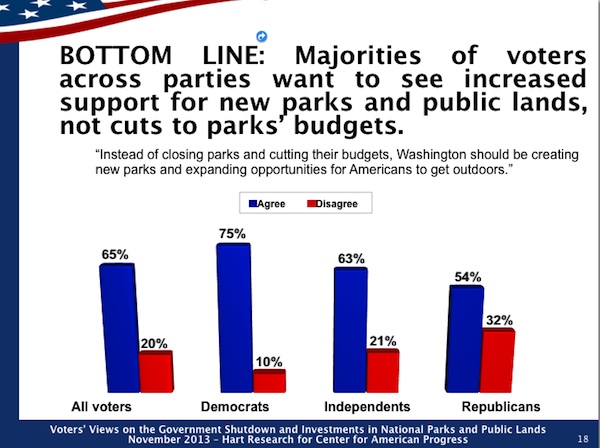Congress, not the Obama Administration, must shoulder the blame for the 16-day closure of the National Park System last month, according to a recent survey of voters.
Beyond that, the polling showed Americans love their national parks and don't want to see them impacted further by budget cuts.
“I think the main points that I take away from all of this is that the closing of the parks and other public lands during the government shutdown was a teachable moment for Americans," Geoff Garin, president of Hart Research Associates, said during a conference call Friday to discuss the polling results.
"And it was a moment when Americans were reminded about the importance of the parks and the other public lands to the country and also about the economic importance of parks and public lands to the communities where they live."
The strength of the poll, he offered, was that while there were some partisan differences on some questions, overall there was bipartisan support among voters for the national parks. Of the 1,005 registered voters surveyed, 38 percent described themselves as either mostly Democrats or leaning Democratic, while 32 percent said they were either mostly Republican or leaning Republican. Twenty-six percent identified themselves as Independents.

The poll, taken Oct. 31-Nov 4 for the Center of American Progress, portrays Republicans in Congress as largely uncaring for national parks and public lands in general. Just 19 percent of those surveyed said Republicans were doing a good job protecting national parks and public lands for future generations, with 53 percent voicing the opinion that they weren't.
While President Barack Obama received better marks on parks and public lands, they still were weak, with just 31 percent of those surveyed saying the president was doing enough to protect national parks and public lands and 37 percent saying he wasn't doing enough.
Democrats in Congress fell in between the GOP and the president, with just 28 percent saying they were doing enough for parks and public lands vs. 42 percent who weren't impressed with Democrats' actions.
The poll, which also contained questions on oil and gas drilling on public lands, provides a portrait of public opinion on how the public domain should be managed.
One interesting aspect of that portrait is that a rather strong majority, 60 percent, of Americans don't know a lot about public lands and the issues that swirl about them. While 8 percent of the respondents said they knew a "great deal" about public lands, and 31 percent said they knew "a fair amount," another 27 percent said they knew "just some" about the public empire and its management, 26 percent said they knew very little, and 7 percent claimed to know nothing at all about the public landscape and its issues.
Perhaps that should not come as a surprise, as the U.S. Bureau of Land Management manages the largest swath of public lands, and those are in the wide-open West, away from the more populous Eastern seaboard and West Coast. "National parks," though, range from coast to coast, carry a strong cachet, and evoke thoughts of beautiful landscapes populated with wild animals, gushing streams, thick forests, and clean air.

While only a slight majority, 52 percent, said it was "a very or pretty big problem" that the National Park System by and large was shuttered for 16 days in October do to Congress' failure to resolve the country's fiscal affairs, 82 percent were of the opinion that "the closing of national parks during the government shutdown was a good reminder of how important the national parks are and why we need to keep them open," noted the pollsters.
Mr. Garin, when asked if it was significant that the polling showed that 48 percent of those surveyed didn't see a problem with the park system's closure, replied that that wasn't necessarily a big deal.
"To me, what I find more surprising is not that 48 percent said it's not a big deal, it’s that 52 percent did say it’s a big deal," he stressed. "Reality is is that by the time we asked this, the shutdown was over, the parks were reopened, everybody had access to them."
And yet despite the relatively short duration of the shutdown, a majority of Americans nevertheless considered it a big deal even two weeks after the parks had reopened, the pollster noted.
"Beyond that ... it’s not that people had that feeling of this is a bad thing, but it’s really the takeaway. What did people learn about the parks in this teachable moment," Mr. Garin said. "And the important part is not about what happened in that instance, but that the closing of the national parks during the government shutdown was a good reminder of how important the national parks are and why we need to keep them open.”
What really stood out, he said, was the bipartisan support for the national parks.
"Even for the sake of the budget deficit, Republicans and other voters say that we should not be letting this next round of sequester cuts go into effect. Republicans say that by a margin of 2-1, 62-31," said Mr. Garin.

Fifty-five percent of the respondents said that the $153 million in cuts absorbed by the National Park Service earlier this year when the budget sequestration kicked in went too far, while only 22 percent the cut was "about right," the pollster said.
And yet, according to the polling, just 39 percent said Park Service funding should be restored to levels prior to the sequestration, while 46 percent said it should be maintained at current levels. With another round of sequestration cuts scheduled to take hold in January, 74 percent of those polled (82 percent of Democrats, 75 percent of Independents, ad 64 percent of Republicans) expressed the belief that the national parks should be off-limits for them, he said.
"There is no clamoring in the country at all for additional budget cuts for the national parks. And indeed, it is a majority of Americans who feel that we’ve already gone too far in cutting funding for the parks," said Mr. Garin. "I would just note here, that even among Republican voters, who are the most fiscally conservative, they are evenly divided on this question. As many Republicans have said they’ve gone too far as say that they haven’t gone far enough, or that they should go further.
“I would dare say there are very few categories of government spending of which this would be true for Republicans. And funding for national parks and public lands really stand out in this regard.”

While one reporter questioned whether the results shouldn't be surprising considering the value placed on national parks, that the outcome would be the same if they were asked whether they were "in favor of killing kittens," Mr. Garin said the lack of surprise in the polling results was exactly the point.
"Parks and other public lands really are honored and a special function of government. To use your kitten analogy, they don’t want to kill the kitten when we’re going through the sequester cuts. That’s what the reality is," he said.
At the Coalition of National Park Service Retirees, Chair Maureen Finnerty said the strong support for the national parks should come as no surprise.
"The Hart Research Associates survey underscores what the Coalition of National Park Service Retirees knows from first-hand experience. Americans love their national parks and want them to be open and adequately funded," she said in a prepared statement.
"Furthermore, Americans are sick and tired of those in Congress who use national parks and National Park Service employees as pawns in partisan budget showmanship games.”
Among the poll's findings:
* Sixty-five percent of those polled (75 percent of Democratic respondents, 63 percent of Independents and 54 percent of Republicans) said that instead of cutting the National Park Service budget, "Washington should be creating new parks and expanding opportunities for Americans to get outdoors."
* In the area of national parks in particular, and public lands in general, the poll results pointed to a rather strong (58 percent) belief that the government should focus more on conserving and protecting public lands (58 percent), than on permitting drilling on those lands (22 percent).
* As for the politics behind the parks' closure, 60 percent agreed with the statement that "the federal shutdown occurred because Republicans in Congress were not willing enough to compromise with President Obama," while 53 percent said it was the president's fault for not being willing to compromise.
As for any possible Tea Party influence on the government shutdown, those polled broke 50-50 on the question of whether the shutdown "showed that the Tea Party has too much power and control in Congress."
The survey did not ask whether Senate Democrats were at fault for not taking up House proposals to fund the Park Service during the shutdown.
* The survey also showed that a strong majority (76 percent) believed the shutdown had a "serious impact on local economies" of gateway communities, while 65 percent were of the opinion that "instead of closing parks and cutting their budgets, Washington should be creating new parks and expanding opportunities for Americans to get outdoors."



Comments
Rick - but you get to close only the parts that will create the biggest outcry? I didn't see you demand that the 70% of the government that continued to be funded be shut down. What happened then to "the government is open or it is closed"???
EC, What most don't understand about the closures is that what was put into place was, from what I've seen and heard, exactly what was put into place in previous Government shutdowns. The difference was the timing. The closure in '95/96 was in late December and January as I recall. It was not at the height of the fall season, when weather in many areas is still good and fall colors are at the peak. National Park Service closures were not really an issue in that mid-winter shutdown. Have you been on the Mall in December and January? The weather usually isn't the greatest for visiting the Memorials. It also isn't a great time for visiting Blue Ridge Parkway, the Grand Canyon or a lot of the Utah parks (I'm listing the ones that seemed to make the news). I know you are going to ask me to document/defend my assertion. I am speaking from personnal recollection and from conversations with friends regarding their recollections of previous Government shutdowns. So no, I cannot document it and that does not make it any less valid.
Not "less valid" totally invalid.
EC -Whatever....
Rick, you can bet money that turn out will be big 2014. This shutdown was different, especially the enforcement of the concession permits, knowing it would hurt and get attention. Its an example of the over enforcement and over regulation beauracracy that not only affects the NPS but most federal agencies have allowed themselves to be buried in by the liberal mental disease. Its clear the NPS is suffering dearly these days because of this problem they created...
OldRanger is right, the time of year matters. The Pageant of Peace on the Ellipse was surrounded by a chainlink fence during the December 95-96 shutdown as that is a high visitation time for that park area between the National Mall and the White House.
During the 1990 Columbus Day Weekend shutdown, VP Quayle and family went for a horseback ride through Manassas Battlefield accompanied by the only 3 park employees that remained on duty. The park was closed to the general public.
http://news.google.com/newspapers?nid=2199&dat=19910816&id=CU8yAAAAIBAJ&sjid=euYFAAAAIBAJ&pg=3034,4230590